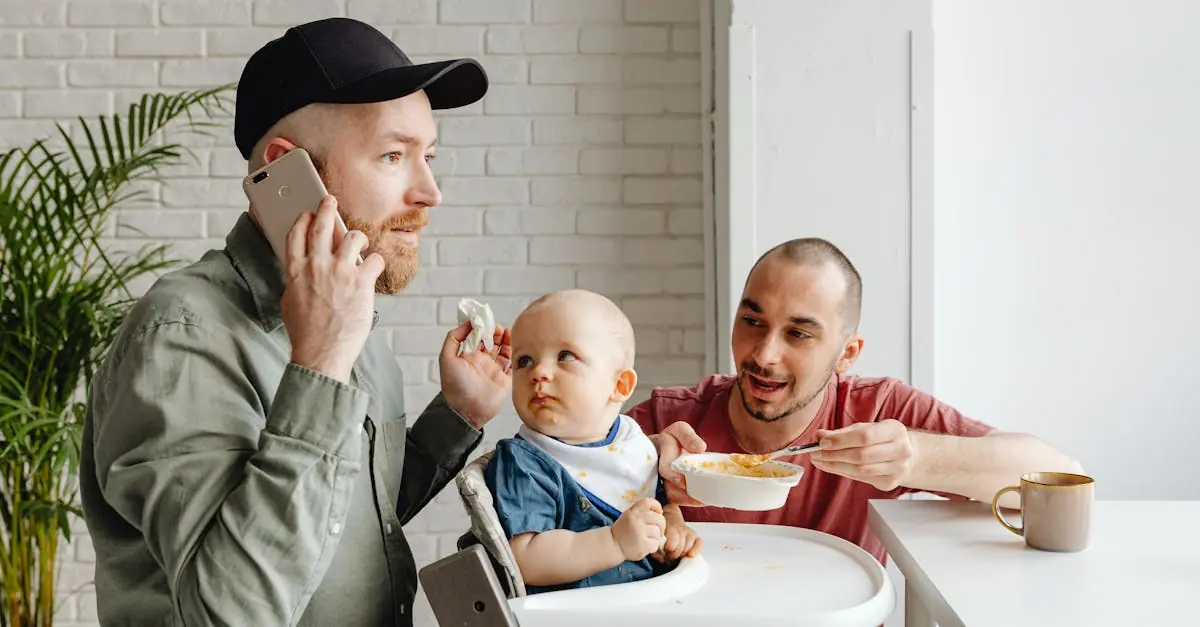Divorce can feel like a rollercoaster ride with all its ups and downs. But when kids are involved, the ride doesn’t have to end. Co-parenting after divorce is like trying to assemble IKEA furniture without the instructions—confusing, challenging, but ultimately rewarding if done right. With the right tools and a sprinkle of humor, parents can navigate this new chapter and create a stable environment for their kids.
Table of Contents
ToggleUnderstanding Co Parenting After Divorce
Co-parenting after divorce involves unique challenges that require patience and skill. Navigating this journey successfully hinges on clear communication and mutual respect.
The Importance of Effective Communication
Effective communication serves as the foundation for co-parenting relationships. Open dialogue helps avoid misunderstandings between parents. Sharing information about children’s schedules, health, and education builds a cooperative atmosphere. Regularly checking in with one another fosters trust and collaboration. Active listening also plays a critical role, allowing each parent to feel heard and valued. Establishing communication channels, such as text or apps, simplifies sharing updates. When parents prioritize clear communication, they create a stable environment, essential for their children’s well-being.
Establishing Boundaries
Setting boundaries is vital for successful co-parenting. Parents should determine what topics require joint decisions and which areas involve individual choices. Clearly defining these parameters helps prevent conflicts. Respecting each other’s privacy reinforces trust and mutual respect. Creating a parenting plan outlines responsibilities, schedule, and rules, establishing clarity. Parents can also agree on consequences for rule violations to maintain consistency. When both parties adhere to set boundaries, it fosters a cooperative parenting dynamic, benefiting everyone involved.
Challenges of Co Parenting After Divorce
Co-parenting after divorce presents various challenges that significantly affect all parties involved. Parents often struggle emotionally as they navigate changes in their lives and relationships.
Emotional Struggles for Parents
Parents may experience feelings of sadness, anger, or guilt post-divorce. Stress can increase due to financial worries and changes in living arrangements. Each parent’s adjustment to a new routine may lead to anxiety about their children’s well-being. An inability to let go of past grievances can further complicate interactions. Maintaining a cooperative relationship becomes challenging when emotions run high. Seeking support through counseling or peer groups can help parents manage these emotional hurdles.
Impact on Children
Children often face their own emotional turmoil following a divorce. They might struggle with feelings of abandonment or confusion over changing family dynamics. Common responses include anxiety, behavioral changes, and difficulties in school. The parenting styles of each parent can cause additional stress for children. Conversations about the divorce should occur, allowing children to process their feelings and ask questions. Environments that encourage open communication foster stability and emotional health for children during this transition.
Strategies for Successful Co Parenting
Successful co-parenting hinges on structured approaches that promote harmony. Implementing practical strategies eases the transition for both parents and children.
Creating a Parenting Plan
A detailed parenting plan outlines responsibilities and expectations, providing clarity for both parents. This plan should include schedules for custody, visitation, and holidays. Establishing rules and guidelines about discipline and communication helps maintain consistency. Parents must involve their children, when appropriate, in discussions about the plan, reinforcing their sense of security. Regular reviews and updates to this plan allow it to adapt to changing circumstances, ensuring it remains relevant.
Navigating Conflicts
Conflicts will arise, but effective techniques can manage them. Parents should prioritize open communication to address disagreements promptly. Actively listening to each other’s perspectives fosters understanding and reduces tension. Keeping the focus on the children’s best interests remains essential during discussions. Involving a neutral third party, such as a mediator, can facilitate better communication and resolution. Utilizing conflict resolution strategies empowers both parents to work together cooperatively, modeling effective problem-solving for their children.
Legal Considerations in Co Parenting
Legal factors play a crucial role in co-parenting arrangements after divorce. Understanding these elements helps parents effectively navigate their responsibilities and rights.
Custody Arrangements
Custody arrangements determine where children will live and how decisions will be made. Parents typically choose between sole or joint custody based on their circumstances. Joint custody allows both parents to share parenting responsibilities, fostering collaboration. Sole custody grants one parent primary authority for decision-making, which may impact the other parent’s involvement. Courts consider various factors, including children’s best interests, when establishing these arrangements. An attorney or mediator can help draft custody agreements that address custody schedules, visitation rights and communication methods. Ultimately, aligning these arrangements with children’s needs promotes stability and support in their post-divorce lives.
Modifying Agreements
Modifying custody or parenting agreements becomes necessary when circumstances change. Factors like relocation, changes in family dynamics, or shifts in children’s needs can prompt these modifications. A parent seeking changes must usually demonstrate a significant change in circumstances. Courts generally prioritize children’s best interests when considering modifications, ensuring their welfare remains at the forefront. Documenting any required changes helps maintain transparency between parents. Collaborating with a lawyer can streamline this process and ensure legal compliance. Maintaining open communication during modifications fosters a cooperative atmosphere, reducing conflict and stress for everyone involved.
Navigating co-parenting after divorce isn’t easy but it’s essential for the well-being of children. By prioritizing communication and setting clear boundaries, parents can create a supportive environment that benefits everyone involved. A well-structured parenting plan can further enhance stability and consistency in children’s lives.
Emotional challenges are inevitable but addressing them openly helps foster resilience in both parents and children. Seeking support when needed can make a significant difference in managing these emotions. Ultimately, a cooperative approach to co-parenting not only promotes harmony but also models healthy relationships for children, ensuring they thrive despite the changes in their family dynamics.




